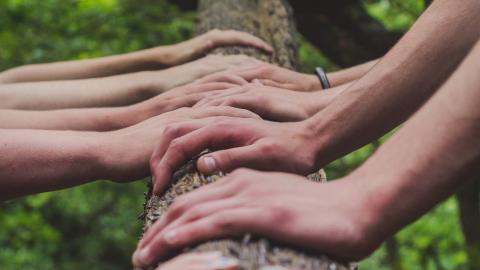
We sat down with Dr. James Walters, NGO Representative to the United Nations for the Sisters of Charity Federation.
At the UN, Jimmy represents the Federation in their commitment of charity, justice, and human rights. Walters also facilitates Catholic retreats throughout New York. He lives on Long Island with his family, and is the author of a recent book published by New City Press, Batter Up: Answering the Call of Faith and Fatherhood. For this issue devoted to families, we asked Jimmy about being a father.
You compare playing baseball to being a father. Tell us what you mean by that.
Baseball presents a welcoming, familiar, and safe concept to explore fatherhood as a calling. In Batter Up, each chapter (or inning, as we structured it) gives attention to different aspects or seasons of fatherhood. For example, “Spring Training” explores preparation for fatherhood, “Opening Day” is when your child is born, “Painful Loss” addresses miscarriage and other challenges, and “Teammates” speaks to the role of our partner and community of support. Each inning, like in baseball, offers its own joys, strategies, and challenges.
What are a few things you wish someone had told you, to prepare you for fatherhood?
I’m still trying to learn, now seven years in, to be, in the words of Irish poet, John O’Donohue, “excessively gentle with yourself.” This comes from his poem, “For One Who Is Exhausted,” which I keep handy to re-read from time-to-time.
Being a father is hard, and it can feel like the world is weighing heavily on your shoulders. There is great temptation to question all your life’s decisions when you feel that you are not providing enough or living up to the expectations of your family, society, and even the Church. The reminder to be excessively gentle with yourself offers a grace that allows us to breathe, to take a moment to be grateful for all that is, and to turn to God to remember that God accompanies us in this life as we imperfectly respond to this calling each day.
In return, we are also called to be excessively gentle with others—especially our children, partners, and our own parents and elders. Leading with patience and empathy, while not always achieved, is worth striving for as we extend what we ourselves seek.
What advice would you give to a soon-to-be father?
Fathers have their own path to this vocation. I was thirty-four when my oldest was born, so my experience is different from a soon-to-be dad in his twenties. My wife and I were married for five years before she was pregnant, and I cherish those days when we had some wonderful experiences and time to grow as a married couple. It prepared us for our lives now with a solid foundation.
This isn’t the same for everyone. In my twenties, I was working full-time, going to school at night, and fully invested in my professional and spiritual growth. When I met my wife at twenty-five, my whole world changed for the better. Life quickly moved from me to us and then when our oldest was born, that us became a little bigger
So, my advice for soon-to-be young dads is to find ways to continue to grow as a person and as a couple with your partner. Your youth will serve you well with the sleepless nights, but make sure you find time to continue to learn and grow together as not just parents but also as a couple. This formation never ends, it continues to deepen if you allow it.
What does it mean to call parenthood a “vocation”?
The best definition of vocation is a calling from God. Think about it, try to wrap your head and heart around this idea that God has called you to this specific vocation–the role as parent.
In prayer, try to appreciate your role as a calling. Look at the gifts and talents you have, the parts of you that are weird, and even aspects of yourself that you didn’t always understand and appreciate before, and see now how these attributes are all a part of God’s plan to serve and to love.
As a vocation, also fatherhood calls us beyond our children. For example, I work at the UN, advocating for the rights of those who are underserved and under-represented. In this ministry, I continue to learn of the many children who are in desperate need of basic human rights such as education, healthcare, clean water and air, among many other justice issues. To take just one example, nearly 130 million girls around the world are not enrolled in formal education, and more than half of those are in crisis-affected countries. What does this mean to us as fathers? How do we come to see all children, both locally and globally, as part of our responsibility as a human family?
If you enjoyed this article, you might like...














